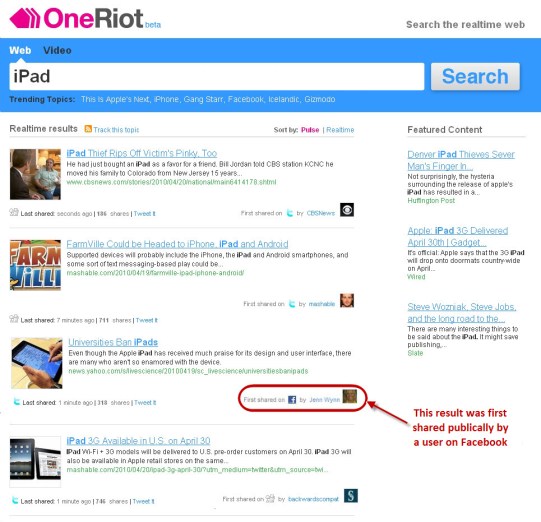
Third-party search engines are starting to index some of the new real-time Facebook data unveiled last week.
OneRiot, a real-time search engine that raised $27 million in venture capital, has started indexing “likes” that are publicly shared on Facebook. It uses the data as a “social signal” about what links and pieces of content are interesting to people on top of real-time data it collects from sites like Twitter and Digg. So if a lot of people “like” a news story about the iPad, that page will float to the top of OneRiot’s search results about iPads.
Allowing third-parties to access the company’s public real-time data is a big change from last year, when Facebook typically signed deals to share that content. Microsoft closed a deal with the social network last year to index public status updates, while Google only got a deal to index status updates from Pages, which tend to be marketing vehicles rather than authentic personal profiles.
AI Weekly
The must-read newsletter for AI and Big Data industry written by Khari Johnson, Kyle Wiggers, and Seth Colaner.
Included with VentureBeat Insider and VentureBeat VIP memberships.
You can look at Facebook’s public search results while being logged into the social network or at https://graph.facebook.com, which shows results in a format that’s easily readable by third-party applications. Here’s an example search for the term “technology”.
Last week, at Facebook’s first developer conference in two years, chief executive Mark Zuckerberg outlined the company’s ambition to map all people’s relationships between each other and the things they care about on the web. Dubbed the “Open Graph,” the strategy represents a shift in how the company thinks the web should be structured in coming years.
In the 1990s, Yahoo rose to prominence through the popularity of its curated web directory. But it rapidly fell by the wayside as Google found a more scalable way of indexing the web through hyperlinks and PageRank. Zuckerberg proposed a substantially different way of mapping the web last week, when he suggested that people’s relationships with each other and with objects like bands, restaurants and books would be an even more powerful way of structuring the web.
“A document-centric approach is being replaced with a people-centric view,” wrote OneRiot general manager Tobias Peggs. “Historically, the big search engines were based on an exhaustive index of all the pages on the web. They then determined the relevance of each page and ranked their search results based on factors like the number of in-bound links to that page.”
Peggs said such results were “authoritative but static.”
VentureBeat's mission is to be a digital town square for technical decision-makers to gain knowledge about transformative enterprise technology and transact. Learn More